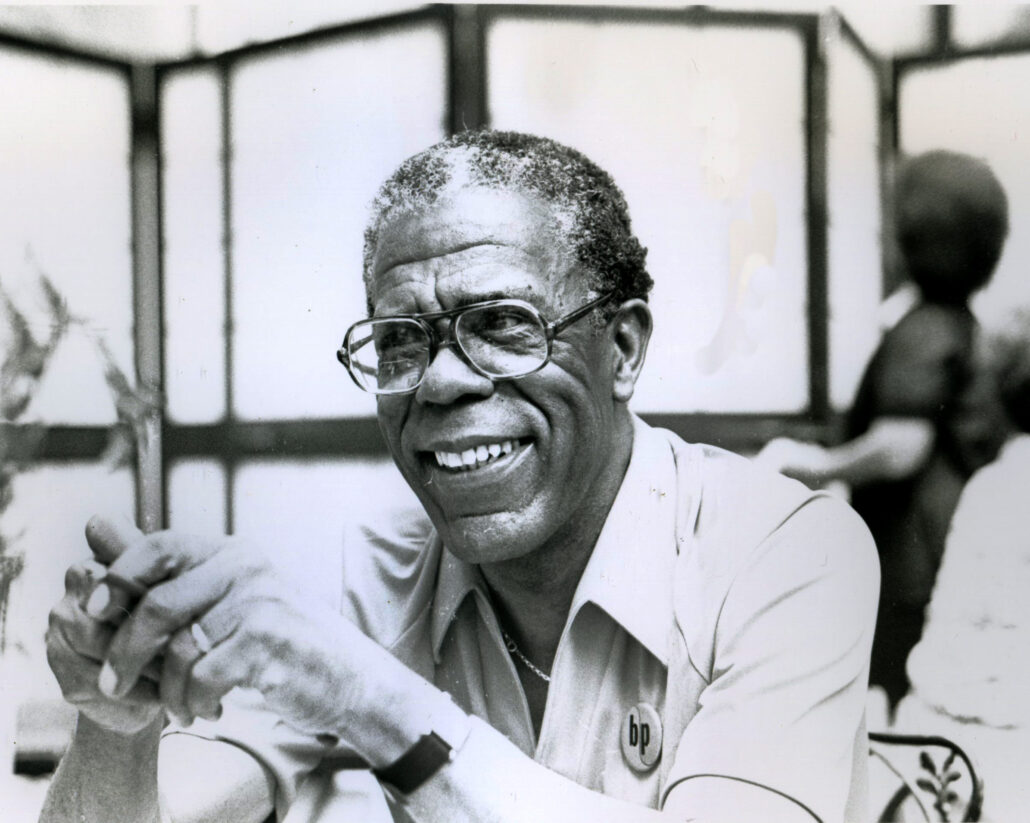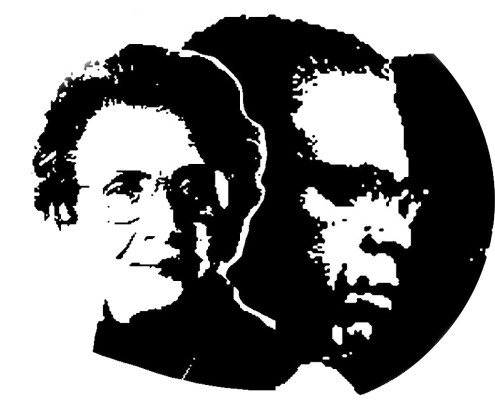
Poet, Librarian, Publisher
The Broadside Press Legacy of Dudley Randall,1965– 2015
On any given summer morning, a neighbor might glance the young boy Dudley Randall huddled atop the porch awning of his Russell Street home on Detroit’s Eastside. There in the shade of a tree, the shy boy studied the great poets of the past. Young Randall’s parents, a minister and school teacher, introduced him to the best of European literature and the treasures of African American culture. His father, an activist member of the NAACP, took him to the speeches of race men like Dr. W.E.B. Du Bois and James Weldon Johnson, the thought leaders of the period. In this nurturing environment, Randall embraced his calling as a poet. In 1927 one of his sonnets won publication on the “Young Writer’s Page” of the Detroit Free Press. He was thirteen years old.
Randall graduated from Eastern High School in 1930. Two years later he found work in the foundry of Ford Motor Company’s Rouge plant. Subsequently he was employed by the post office until 1943, when he was inducted in the U.S. Army. Returning to Detroit in 1946, Randall resumed work as a postal clerk as he earned the bachelor’s degree in English at Wayne State University and the master’s degree in library science at the University of Michigan. His career as a reference librarian took him to Lincoln and Morgan State universities, then back home to posts in the Wayne County library system, and finally to the University of Detroit Mercy, where the installation of a National Literary Marker commemorates the eminence of his contributions as a librarian and poet.
Randall’s training as a librarian influenced every detail of his work — from the scrupulous editing and promotion of other poets’ writing, to setting down the exquisite lines of his own poems. The fusion of his wide-ranging knowledge as a librarian with his poet’s aesthetic sensibilities engendered a rare talent. Perhaps it was this combination of artistic and literary sophistication that called him to the roles of editor, publisher, mentor of poets, and founder of Broadside Press.
In an article published in the Black Academy Review in 1970, Randall wrote: “We Africans in the United States are a nation of 22 million souls, larger than Athens in the age of Pericles or England in the age of Elizabeth. There’s no reason why we should not create and support a literature which will be to our own nation what those literatures were to theirs.”
Guided by this vision and mission, Randall created Broadside Press as a solitary project, perhaps not realizing how demanding the work would become. When his friend, the Pulitzer Prize winning poet Gwendolyn Brooks, wanted to know his title within the Broadside Press organizational structure, Randall laughed and replied, “Since … in my spare time and in my spare bedroom I do all the work from sweeping floors, washing windows, licking stamps and envelopes, and packing books to reading manuscripts, writing ads and planning and designing books, you could just say that Dudley Randall equals Broadside Press.”
Randall began by producing 8 ½ by 11” broadsides that featured a single poem, an idea he borrowed from the Russians after a trip to the Soviet Union. The publishing of “Ballad of Birmingham,” Randall’s poem on the bombing deaths of four little girls in a church during the civil rights movement, launched Broadside Press in 1965. By the mid 70s, the Broadside collection had grown to over 100 publications, including single broadsides, books, audio tapes, lps, and posters, which were in demand by individuals, book stores, universities, and libraries around the world. The protest against the inhumanity of southern racism expressed in “Ballad of Birmingham” conjoined Broadside Press with the African American freedom fight of the 1960s. Liberation struggles were being waged throughout Africa, Asia and Latin America, with the African American civil rights and Black Power movements constituting a significant flank of this global uprising. Broadside Press flourished as the institutional anchor and center of African American literary production during this period.
Several generations of African American poets are represented in the Broadside Press repertory. The first includes Randall himself and his peers, Gwendolyn Brooks, Margaret Walker, Margaret Danner, Robert Hayden, and Sterling Brown. These poets’ works laid the foundation for the wave of writers who won recognition in the 1960s – 70s — Nikki Giovanni, Sonia Sanchez, Haki Madhubuti, Etheridge Knight, Audre Lorde and South African Keorapetse Kgositsile — poets who had been turned away by mainstream publishing houses, who might have remained unknown if Randall had not published their work. In addition, there is the constellation of talented poets published by Broadside from the 1980s to the present.
Broadside Press publications reflect the most important issues of African American political and cultural life from the first world war to the the 21st century, expressed in a diversity of literary forms, including revolutionary manifestos, exquisite love songs, humorous toasts, and yearnings for freedom. By demonstrating both the fine quality of poetry emerging in the African American community as well as the fact that there was indeed a substantial reading audience for that poetry, Randall made an invaluable contribution to the literary heritage of the United States, the African diaspora, and the world.
During his mature years, Randall and his wife, Vivian, shared a comfortable ranch home on Old Mill Place in Detroit’s Russell Woods neighborhood. When Randall decided to relinguish control of the Press, he sold it to his friends and Russell Woods neighbors, Hilda and Don Vest. Hilda applied her experience as an educator and poet, Don his managerial expertise as a retired auto company executive, to the management and advancement of the Press. During their tenure, the Vests published more than a dozen new titles. In 1998 they passed ownership to a collective of Detroit cultural activists, who are committed to upholding Randall’s legacy: affirmation of the beauty of African American culture, editorial excellence, and profound respect for artistic differences among African American writers.
Mayor Coleman A. Young appointed Randall the first Poet Laureate of the City of Detroit in 1981, praising him as the “Father of the Black Poetry Movement.” Literary scholar, Professor Julius Thompson, extolled Randall’s achievement in the following manner:
All his prior work in developing as a writer and training in library science would be harnessed to give birth to the most important publishing company ever created by an African American, to promote the publication, distribution and enjoyment of Black poetry. In a period of great hardship he sacrificed much in terms of his own personal comforts to help hundreds of writers lift their voices. American culture is much richer today because of Dudley Randall and Broadside Press.
Julius Thompson. Dudley Randall, Broadside Press, and the Black Arts Movement in Detroit, 1960 – 1995. Jefferson, NC: McFarland & Company, 1999.
Dudley Randall — soft-spoken, thoughtful, compassionate, possessing a quiet, delightfully wry sense of humor — passed away after a struggle with cancer on August 5, 2000. We honor him as we celebrate the 50th anniversary of Broadside Press.
